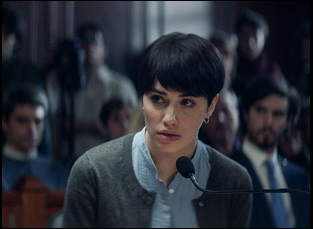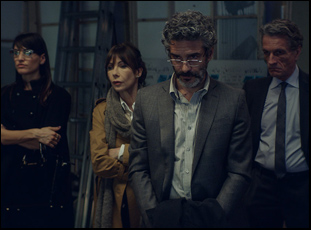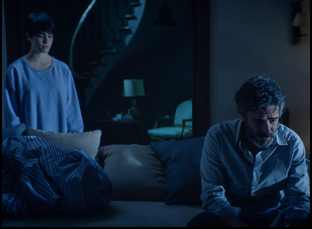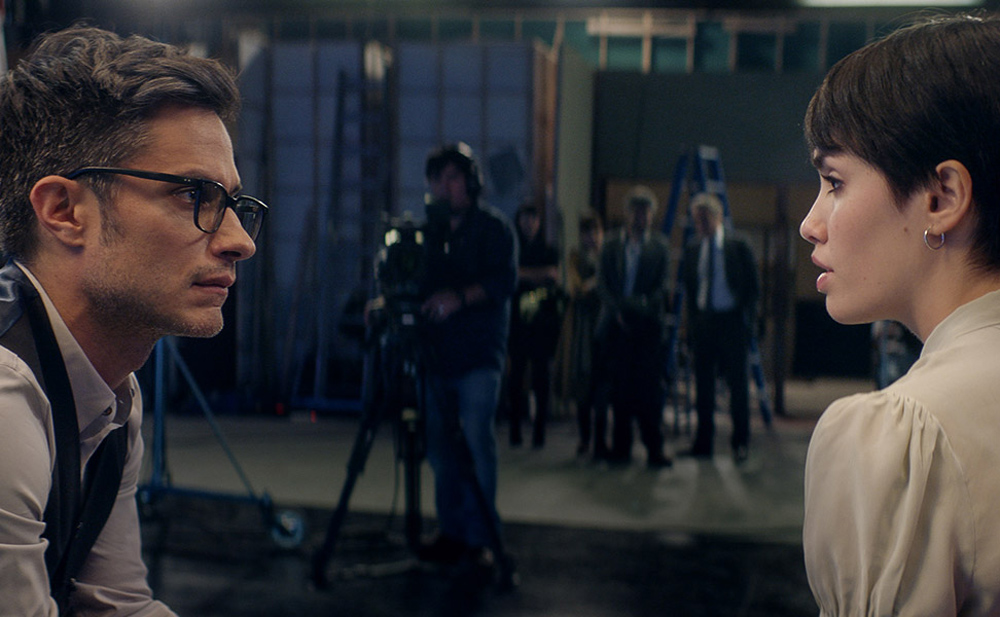Somewhere near the start of filming “The Accused,” Gonzalo Tobal described a long tracking shot to his crew that would follow the film’s lead character Dolores (Lali Espósito) as she walks into her family’s home, essentially being ransacked by the police who have a search warrant triggered by the death of her friend that she’s the primary suspect for, and the camera would be asked to float upstairs and down and she’s dazed by it all. Then he wanted to do it within the limited time frame of magic hour when the sun is setting.
“They were all looking at me like, “It is not going to happen,” Tobal says, with a grin starting to curl across his face. “But yes, we did it.”
In retrospect, a trial by fire was the only appropriate way to kick off filming on “The Accused,” which offers a tantalizing spin on a legal thriller by taking a most unusual perspective. Less interested in guilt or innocence than how that conclusion is arrived at by the court of public opinion, Tobal’s sophomore feature is centered on Dolores, who stands trial for murder, but sees the case grow further away from her as both the media and lawyers, including those working on her behalf, construct their own narratives about what happened and who she is.
The writer/director wisely refrains from fact-checking, keeping the enigmatic Dolores a continual source of surprise and intrigue as you end up in the shoes of those obsessed with her trial, making assumptions that you can never be quite sure are based in truth or cultivated by spin doctors. Dolores can afford the best, coming from a well-heeled family with a palatial estate that nonetheless feels like a prison since media attention has all but trapped inside. Observing how she is forced to make decisions with regard to how things look rather than how she sees them, Tobal wrings considerable tension out of whether Dolores will lose her sense of self before a verdict is reached, as her instinct remains to act out of moral conviction even when it doesn’t serve her interests.
Shortly after the provocative drama has started all kinds of conversations at the Toronto Film Festival, following a well-received bow in competition at Venice, Tobal took the time to have one with us.

The film was inspired by the way we follow all these crime stories through media, and the way the media covers them, the way they build them as narratives. I’m aware of this procedure by being a film director, but at the same time, I can’t help but being calculated many times by the stories themselves and I’m always wondering what about these people involved in [shaping these narratives]? It’s not fiction, but [the people involved] are going through terrible situations, and their privacy is so exposed. So from this, I started to write this story, which is like a crime thriller but told from the intimacy of the family relationships.
It seemed slightly unusual to me that you put a disclaimer upfront that this isn’t based on a true story when there’s such a strong sense of authenticity. More often than not, filmmakers like to promote what they’re doing has some basis in truth.
Actually, I did a lot of research during the writing of the script. I met specialists [in the field] from crime journalists to the lawyers and I went to see trials back in Argentina. I wanted this sense of reality, but the disclaimer has to do with the fact that somehow the story gets associated with some real cases in particular, and it wasn’t at all my idea to speak about any real person or real situations. The film is completely fictional. [But as people see the film and talk to me, people see similarities to something that] happened back in Argentina, but also in Venice, with a case that happened there, and the now a Mexican asked me about a Mexican case, and today, a Peruvian asked me for a case in Peru. Evidently, there’s an archetype of a lot of cases which are similar, but the idea was to build a fictional case that could be possible and intriguing.
It must’ve reinforced your idea about seeing these narratives being created. Did anything come as a surprise in doing your research about the machinery?
A lot of things surprised me. And I think there are many paradoxes in the film. One of them is a quote we found that many times, when a case like this gets so media-cized, then there are two battles. One, the battle in court, but as important as that, sometimes even more, is the battle to gain the public opinion and this contradiction is very important in the film. The family here and their team is very aware of this. They are fighting these two things at a time.

She’s a big star in Argentina and Latin America, and it was some sort of miracle. I’m glad that somebody [contacted] her, and she read the script, and said that she would be very interested, which is something that I wouldn’t expect at all. She’s never done such a dramatic role. She grew up making soap operas on TV, and when I cast her, I asked her to come with no makeup at all and regular clothes, and it was very interesting to see her in this new, different image than the one that I knew.
It was also a chance to show her in a new, different way because the character of Dolores is a star for very strange reasons – these accusations, so everybody would know her face from the TV, and would probably have an opinion about her guilt or innocence just from the image she projects, so to do this with Lali, who’s a big star, was [subverting this idea] in the film, and the film shows her in a completely different and more intimate way and it proved she was a great actress when it came to acting in a different tone than the one that I knew her from. So everything was meant to be.
There’s an interesting motif throughout the film with a puma on the loose in Dolores’ neighborhood. How did that come in?
The story of the puma, in a way, is a reflection of [the fact] there is a mystery, and a presence of something wild that the community can’t explain if this is real or not. And this [puma story] is also amplified by the media, and it helped me to think about the advent of truth within the film, and how truth is built, and how sometimes what we believe is completely different from what may have happened. In the end, maybe there is no truth, but it’s just images in the speeches and things that we all somehow believed. The film deals with how the society, through the institutions that we have try to solve a mystery, and deal with something that nobody can understand, so all the time there’s this menace of the wild coming from outside of this influence of control and understanding.

Well actually, this is exclusive information for you, but I actually invented the concept of the free range party. [laughs] But it has a lot to do with this feeling of completely different understanding of things between different generations and how the young generation lives their life and the connection with their sex life, their friendships, the exposure of intimacy and private life on social media. and all that. For the [the older] generation, that’s very hard to understand or to deal with, and the parents are really trying hard to find out how to deal with this, so I tried to work with this concept that maybe you don’t understand, but you can understand how this could exist.
Gael Garcia Bernal also has a small, but pivotal role in the film. How did he come onboard?
Actually, Gael is a friend of mine. We met in one of the first, doing a shooting that he did and really wanted to do something together. I [thought] he could be part of the film, at least a small part, and he read the script and really loved it, and yes, for him, we could find this character which could fit in his agenda.
What have the last few days been like, premiering the film in Venice and Toronto?
It was amazing. Completely crazy, but exciting, and amazing. I’m so happy that we could premiere the film this way. It’s a perfect way for the film to come out, and the reception we are having has been really great.
“The Accused” will play once more at the Toronto Film Festival on September 14th at the Scotiabank at 10 pm.




